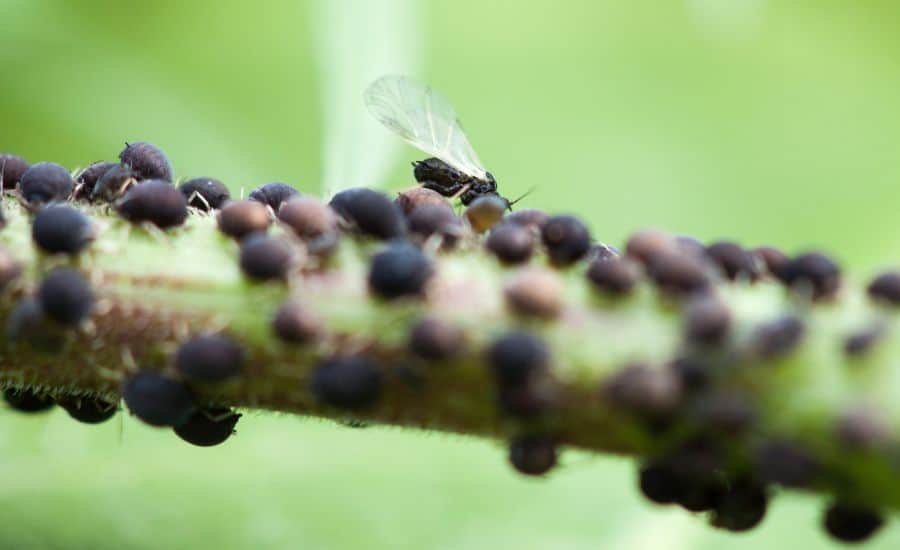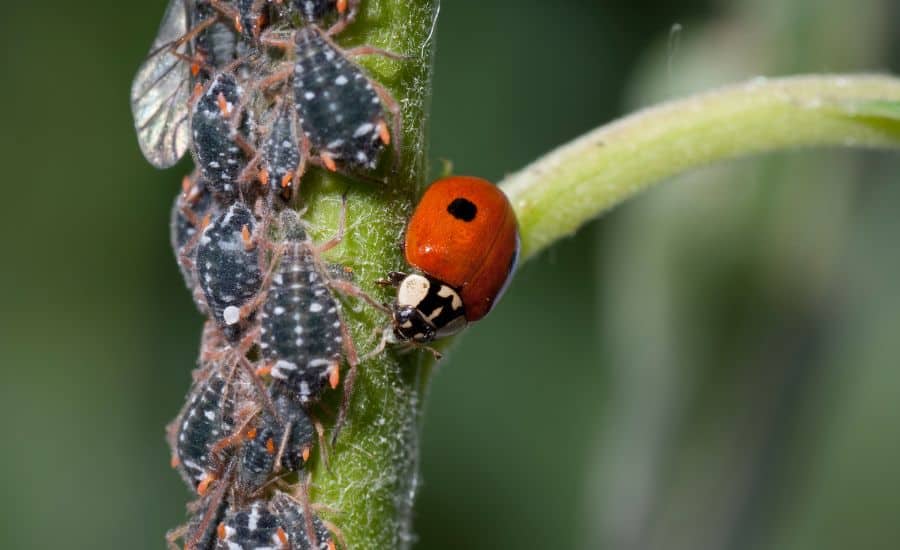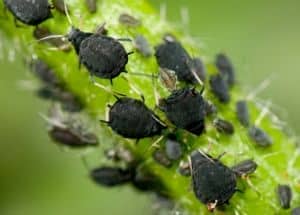In this guide, I will answer the question: “What do aphids eat?” and explain where they most often live. I will tell you in detail about the peculiarities of their food behavior, how they get food, and the ways you can fight them.
You will also learn about what animals eat aphids. This guide will help you find out which traitors feed on aphids and how you can use them to deal with these bugs in your household. Here I share the detailed information that you can use in the fight against these pests.
[wpsm_titlebox title=”Brief Aphid Eaters List” style=”main”]
There are many types of predators that eat aphids, so they can help you a lot if you suddenly find greenflies in your garden:
- Ladybugs;
- Birds;
- Wasps;
- Earwigs;
- Beetles.
[/wpsm_titlebox]
How to Get Rid of Aphids: Effective Methods
Aphids are fairly small insects no more than 8 inches long. They come in many varieties and are easily recognizable by their color, which is either green or red. They have pear-shaped bodies with a pair of horns on their belly, which is the easiest way to identify them. They have a sucking mouth apparatus and feed only on plant sap.
Greenflies like to eat plant stems, leaves, and even roots. If you think that aphids are eating bugs, you are mistaken, their main food is exclusively plants juice. They also multiply quickly, so you need to be careful and immediately take measures to combat these pests as soon as you notice them.
[su_youtube url=”https://youtu.be/tcu62j7uSyU”]
Which harm can aphids cause in your garden?
Aphids quite often penetrate gardens as they like to suck out nutrients and liquids from plants, thereby weakening them. It can even lead to the death of vegetation, flowers, etc. These insects are especially harmful if they form colonies. When they multiply, they can do a lot of damage to your garden, so as soon as you see any signs of aphids, you need to act quickly.
Aphids are especially attracted to seedlings, so you have to pay more attention to young vegetation. It is easy to notice signs of greenflies: You can see the leaves on the ground. If the leaves start to curl or turn yellow, this might mean that aphids have already preyed on them. The sweet liquid they secrete can also attract other insects.

Predators that eat aphids
Many predators can help you deal with aphids in your garden:
- If you are interested in what bugs eat aphids, ladybugs fall into this category. Ladybugs often feed on aphids and other insects. They are small, and there are many different types of them. Red and black spots on their bodies make them easy to identify, and you can often see them on plants. They can help you a lot if you have an aphid infestation in your garden. They will exterminate it, but you have to be aware that ladybugs also feed on vegetation and powdery mildew.
- Birds eat aphids and a variety of other insects while consuming seeds. Studies have shown that the presence of aphids is significantly reduced in gardens with many birds. Thus birds are also beneficial in dealing with these pests.
- Wasps often eat aphids, but you might be surprised to find out that they can also lay their eggs right in aphids. When a wasp hatches from an egg, it feeds on the insides of the aphid and will eventually kill it. Therefore, if you see that an aphid has a brown belly, it means that it is carrying wasp eggs.
- Earwigs are omnivores, and they can help you deal with aphids on your fruit trees. This way, you can save both a tree and fruits, preventing greenflies from reaching them. However, there is a downside: Earwigs often hide and feed on flowers.
- Beetles are very good at killing aphids, and some species are available from bio-defense suppliers. With the help of special beetles, you can keep your garden aphid-free, as they feed exclusively on these insects. This solution can make it easier for you to deal with pests.
Now you know what insects eat aphids. However, some of them can also harm your vegetation, while others can help you deal with an aphid problem.
[su_youtube url=”https://youtu.be/V2871d4vJ4A”]
Fighting aphids with predators
Aphids are the basis of many food chains, and they are also the main food for many predators. They can wipe out an entire aphid colony in your garden, which can be handy as aphid activity shows up early in the spring season. Often, you do not have to deal with greenflies, as insects and birds can do everything for you.
In some cases, though, you still have to fight these pests. To cope with them, you can omit using pesticides. Instead, turn to bugs that eat aphid colonies in the shortest time.
[su_youtube url=”https://youtu.be/fm7kh7C2vqI”]
Some ladybug species also effectively cope with greenflies, but they are less effective than beetles as they can also eat your vegetation. Sometimes, predators won’t help you eliminate aphids, so you should be prepared to get rid of them in other ways. For example, you can use:
- Neem oil or garden oils;
- Ordinary water;
- Soapy water.
All you need to use the above methods is to mix neem oil or liquid soap with water and add this mixture to a spray bottle. You can even use plain water to control aphids. Just wash these insects off your plants using a sprayer. If you drive aphids away from your plants, they will be unlikely to return.
Thus, plain water is an effective way to deal with these pests. The procedure lies in the following: You have to use a pulverizer to wash off all insects from the plant leaves or stem. This method protects plants and deprives aphids of their food source. You should take care that the water pressure is potent enough to wash off all the pests, so you have to invest in a quality sprayer.

FAQ About Aphids Food Tastes
Now you know the basic things about aphids, but I will also answer several questions that might cause your interest. Read on to find my answers below.
What kills aphids instantly?
To deal with aphids quickly and safely, you can use strong water pressure, which will wash greenflies off your plants and prevent them from returning.
Do insects eat aphids?
Most predatory insects feed on aphids, keeping their population at a low level. It also means that you don’t need to use any chemical means to combat these pests. Be aware that some insecticides can reduce predator populations, thereby allowing greenflies to thrive.
What beneficial insect eats aphids?
Ladybugs and green lacewings are considered the most beneficial predators for fighting aphids. They do an excellent job of dealing with large aphid colonies. Many house owners underestimate green lacewings, despite their great potential.
Fight Aphids Using Natural Means
In this guide, I have described the main peculiarities of aphids’ preferences in food. You have learned which harm aphids can cause in your garden and which insects can help you deal with greenflies. I have told you that aphids consume plant juice, thereby leading your plants to wither or die. Their main enemies are wasps and ladybugs, so you can also use them to fight aphids.
Was my guide helpful to you? Which of the above methods appeared the most helpful to you? Share your tips in the comments.
Also read:
References:
- Ladybug – Multicolored Asian Lady Beetle: https://hortnews.extension.iastate.edu/ladybug-multicolored-asian-lady-beetle
- Bird Cherry-Oat Aphid: https://www2.ipm.ucanr.edu/agriculture/small-grains/Bird-cherry-oat-aphid/
- National Pesticide Information Center. Neem Oil, General Fact: http://npic.orst.edu/factsheets/neemgen.html

